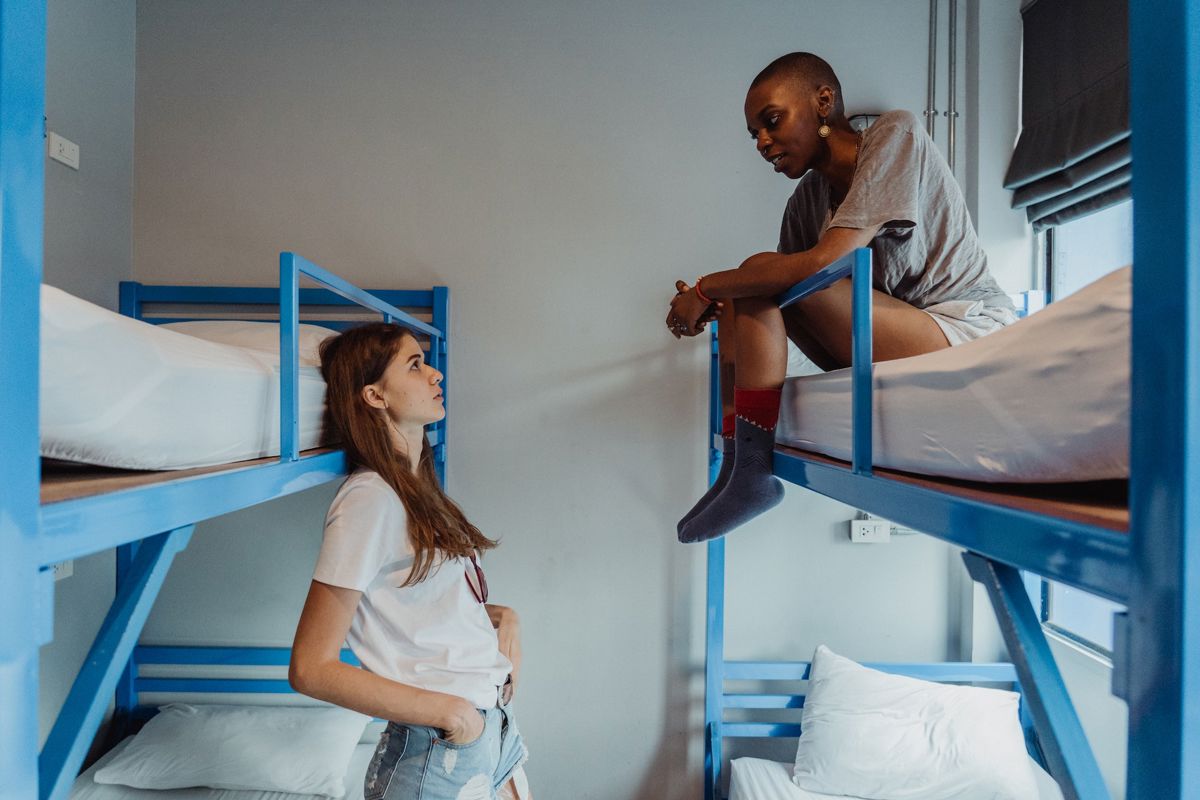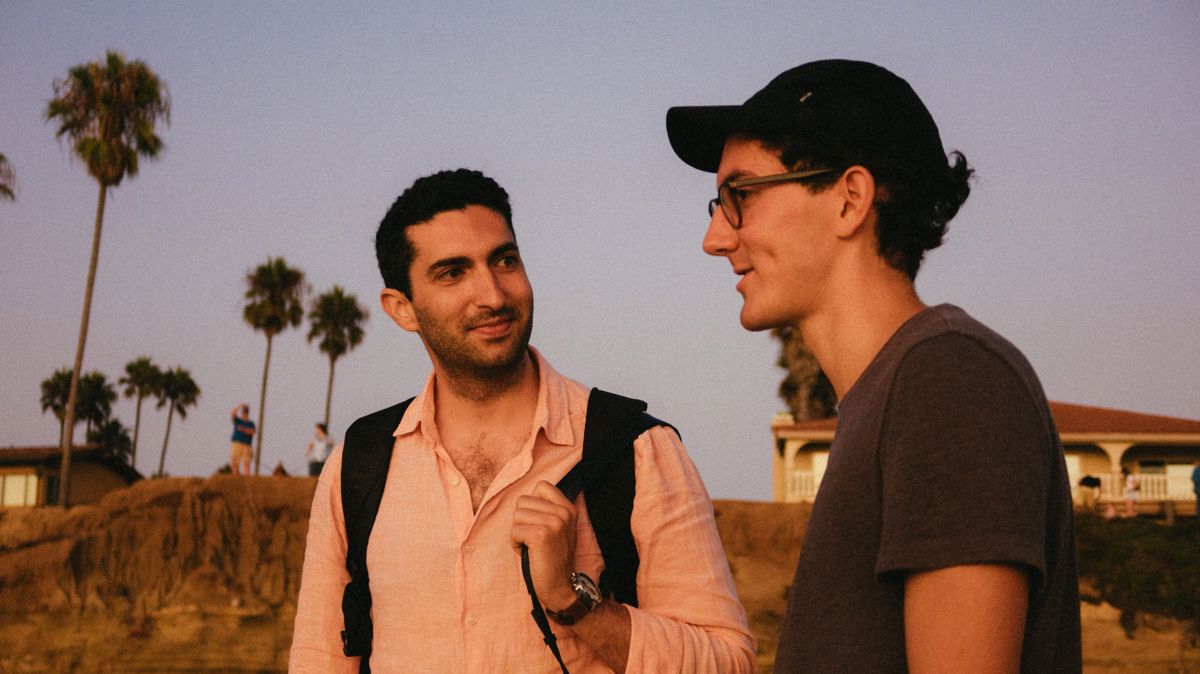Is It Easier to Be Authentic With Strangers?

Table of Contents
She was sitting by the poolside, hiding the dark circles under her eyes beneath big sunglasses.
“Again?” I thought, pursing my lips.
I had seen her this way for a couple of days in a row now.
Both of us were guests of that backpacker hostel on Tenerife, one of the seven Canary Islands and a blissfully warm getaway from the depressing German winter.
I had never spoken to her before, did not know who she was other than… in need of drowning whatever issues in one too many beers each night.
Though I like the taste of a nice alcoholic beverage myself, I am not a fan of uncontrolled behaviour and have a hard time understanding why people do not respect their limits. The way I looked and thought of her, I knew I was judging arrogantly, but could not help myself.
Somehow, though, she also intrigued me a bit. When she laughed, something inside me just opened up and wanted to share her joy.
I do not remember how but we introduced each other eventually.
Next thing I know, we were taking a walk together along the rugged, desert-like coastline. And we talked.
We shared our current wicked struggles, our heart’s desires, our insecurities and it felt simultaneously daring and refreshing to talk about all of this with a stranger.
Luckily, this woman did not remain a stranger but is now one of my best friends, a truly exceptional human being. No wonder she captivated me, during those crazy weeks of being practically housemates, with her warm soul, an incredible capacity for empathy, and an endearing tendency towards a little drama in her life.
I owe this friendship to travelling.

I love travelling. For soooo many reasons.
When I say “travelling”, in this context, I don’t mean a 2-week beach ’n’ chill holiday in a nice all-inclusive resort. I don’t mean packing up your buddies and spending some days in a cabin in the woods.
“Real travelling”, for me, is reserved for the times when I shoulder my backpack and go out into the world – on my own; when I sacrifice the known and the comfort to make space for the unexpected and the expansion.
Why do I do it again and again, travelling? Because I am that lucky person from Central Europe with the funds and the freedom to go roam the planet, while others, elsewhere, have never left their hometown and can’t afford a plane ticket? Touché. I am very privileged to be able to do this, for starters.
My only argument for why travelling is worth the resources spent is: It is my favourite and most effective mode of education. It is where I meet my fears, reflect on life, challenge myself, and grow beyond my current limits.
And it is where I reconnect with the version of me that I like the most. No matter how much I try to remember and incorporate that version of self each time I return from a journey, my day-to-day-at-home self always catches up with it and swallows it whole, eventually.
At home, I tend to be occupied with goals and to-do lists, with planning and stressing, with living in the future and in my own little social bubble, with old habits and narrowed ways of expressing my personality. But when I am travelling, it is as if I come alive fully. Instead of staying in my habits and rituals, I seek the new and challenging. Instead of planning and then anxiously trying to control life so that it unfolds according to my plans, I let go and trust and follow life’s flow more spontaneously. Instead of the never-ending egotistical inner chatter, I open up to strangers and eagerly soak in the stories they have to tell. I feel more emotionally and spiritually receptive, more open-minded, more courageous, more colourful and vibrant when travelling, especially when doing so on my own.
I would love to feel like that all the time.
What Is It That Makes My Travel-Self Come Out When I Am Out There?
I have thought about this a lot. Here is the number one reason I found for myself:
When travelling (alone), all the context information to my person(ality) is lost.
Think about it: A stranger encounters me and unconsciously (or consciously) scans for clues about what kind of person I am. What do they see?
- Yes, I am wearing clothes that speak of me – but usually, my travel wardrobe is different from my everyday life one, let alone because of climate differences and other functional requirements.
- I am not working so there is no workplace, uniform, or role to tell a story about me.
- I am speaking in different tongues, so the words I use, the intonation, the style and humour are not the same as in German, my mother tongue. Language patterns are intertwined with psychological patterns. Hence, leaving behind linguistic patterns (in terms of verbal communication as well as inner self-talk) by switching to another language, inevitably changes the way I think, feel, and experience the world. It changes the person others perceive.
- There are no friends or family members around me who reflect back on me. And, though I am, of course, highly influenced by the way I was raised, I am currently free of any dynamics that keep me in place. No one knows me. No one can demand that I am the way that is expected of me. I can say yes to new things and try out different ways of behaving – and no one would be able to tell that I am acting strangely, or not appropriately for who I “am”.
The stranger who meets me does not encounter day-to-day-life Tina. Instead, they meet the closest version to a “factory reset” of myself that is possible.
This is the time and the place to check the boundaries I have set for myself, maybe inadvertently, and see if a “me” exists outside of it. And it’s “safe”. No one (who matters, anyway) is there to see it and judge. No one will get a heart attack because I act inconsistently with to my usual ways. I can try out the things I always said I would not enjoy, I can meet people who are not usually my crowd, I can challenge my belief system by means of diving into foreign lives for a while. And I am not burdened by everyday demands and responsibilities. I am just not taking everything so seriously for once. I feel free.

One of the most valuable aspects of travelling for me is having chance encounters and conversations with strangers. Of the most candid, deep, and vulnerable conversations I had in my life, many of them took place in the most improbable situations abroad, with people I only met once. When it happened the first couple of times, I was taken aback by the openness that total strangers gifted me with. I delved into painful biographies, dark secrets, and other personal details over coffee at the beach shack, a hike in the woods, or the lounge room of a hostel. Oftentimes, both I and my conversation partner would not even bother to exchange names, for tomorrow each of us would be on our separate ways and meet new faces, new potential stories all over again. Do not confuse the randomness of such an encounter with a lack of meaning – I have learned so much about being human and being myself during such precious moments. I, too, have shared many inner turmoils and flaws and fears with strangers.
Today, I am not surprised at all when it happens again. Quite to the contrary – I think travelling and meeting strangers is the most likely situation to bring your whole self to the table. And to the conversation.
Why Is It Easier to Be Authentic With Total Strangers Than With the People We Know and Trust?
There are a number of reasons why it can be easy to open up to strangers rather than the people you know better.
- First of all, referring back to what I wrote before, when we are outside of our home and social environment, we are freed of the context and dynamics that hold us in place. It is easier for us to escape our patterns, including the patterns of hiding, or judging ourselves, or suppressing topics from reaching our conscious reflection.
- The people we trust most are usually the same people who we crave to like us most. We are afraid of being judged, of worrying them, of doing anything that changes our relationships with them, like growing and changing in ways that could threaten the status quo (even though change is human and constant).
- When opening up to strangers, we can be quite certain that we will never meet them again. We might not even have exchanged names or any other personal details, so we cannot google or follow each other on social media, cannot stalk the lives we will return to after our respective journeys, cannot judge what we might see there in the context of the secrets we were read in on during that one conversation, far away from home. Even if we share our biggest secrets, we will not have to deal with the memory in our back-home-lives, if we don’t want to. We do not have to fear consequences. And, finally, we do not know if we would even like that person we talked to, had we spent more than a few hours with them – so it doesn’t really matter what they think of us. It is almost a judgement-free zone, like a Venetian mask ball, where we are free to play and enjoy ourselves.
- Back in our social circle at home, we might not be presented with an opportunity to speak to someone who resides outside of our mental bubble, who has a different mindset, a different background, a different life. Our friends and family might only reinforce our thoughts, reassure us in our actions, when what we truly want, deep down, is to get honest feedback from a different angle than our own. Sure, to some extent, in whatever place we live, there are most likely a few or even a lot of people from other socioeconomic or cultural or whatever backgrounds whom we could have that conversation with. But let’s be honest: Many of us “coincidentally” end up seeing ourselves represented in our social circle. We seek out others who are like us, it just happens. During our travels, we might get luckier, though: We run into locals who lead a life that is potentially very different from our own. We meet other travellers from other countries. We are confronted with lifestyles, beliefs, values foreign to us. And that’s a precious thing if you want to evolve as a personality.
Apparently, there are many reasons why you might experience your most earnest conversation with a person you just met.
“Is it worth it, though?”, you might ask. Why invest your time and soul in a stranger? Isn’t it a waste getting to know someone on a deeper level when you might never see them again afterwards?
I learned not to think in such a way. Yes, friendships and other long-term relationships are built on the grounds of many, many, many moments of sharing and trust-earning. But it is never a waste to go all in and have a deep conversation with someone who will only have this one moment with you. You might not be able to share the memory together in the future – but you will be able to share it with yourself. You were there. How can a moment of your presence, of living in the NOW, be a waste?
What might you learn about yourself and the world, if you let yourself enjoy that moment?
What might it unleash if, in the presence of a stranger, you dared to voice a truth that is stowed away in your everyday life?
What difference might you make in that other person’s life by sharing your soul and all that makes you human?
And maybe, just maybe, a stranger will become a companion in your life. Like my dear friend who could not hide her lovely personality behind those sunglasses…

Your Turn: How Do You Experience This?
If the aforementioned questions cause something inside your soul to tingle, embrace the next chance for answering them.
Seek out an opportunity to have a conversation with a stranger. Don’t be picky, don’t follow your usual taste in people. Just surrender to a chance encounter.
Don’t know how to access a chance encounter? This can seem very daring in our day-to-day lives. But you can increase the odds by creating space for it to happen. Spontaneous conversations with strangers are more likely when you are
a) on your own, rather than occupied with other people
b) relaxed and open-minded, rather on a clock and on a mission
c) in a place you don’t know and where nobody knows you
d) where there are other people who are in the mood to talk to you.
An example for which you do not need to travel far: You could take the bus, or other means of public transportation, to a neighbour city. Invite in the gaze of other people at the station, instead of staring at the floor. Smile at the person who asks if they may sit next to you. When you arrive, seek out a nice café and be open for others to join your table. Radiate openness.
An example for when you are able to go on a little trip: Choose a destination for a weekend getaway. Even if you have the funds and prefer the comforts of a nice hotel, book yourself into a hostel or something similar. Yes, even hostels have private rooms. So, if you don’t want to experience sleeplessness in a dorm room – with some backpacker snoring your ears off, or a group of partying teenagers disturbing your dreams with their excited chatter at 3 a.m. – you can opt for your private space while still having access to all the common areas. Oh and if you want to wiggle yourself out of this thinking you are too old for a hostel: I have met 70+ year-olds in hostels and they were always the stars of the place, invited to every beer or music jam or storytelling session. The older you are, the cooler you’ll be perceived, trust me.
Hostels are a great place to meet new people, and sometimes even make friends for life. Actually, if you manage to stay at a hostel for a few nights without being invited by anyone to join in for some activity, this would be a crazy and yet questionable achievement. The trick: Stay open, go with the flow, extend invitations, embrace opportunities. That’s the magic.
And while you are enjoying your chance encounters and the memories they create, observe:
How does it make you feel?
Are you acting any different now than in your day-to-day environment?
What do you talk about and what value does it give you?
photos: Roman Odintsov, Andrea Piacquadio, Ketut Subiyanto, Athena (Pexels)
Subscribe
Login
0 Comments
Inline Feedbacks
View all comments